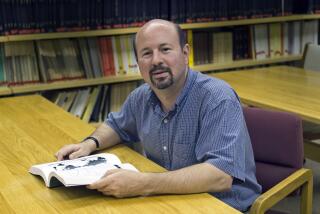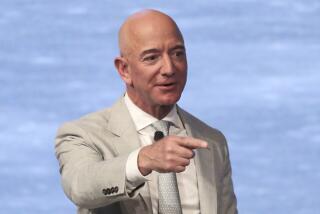The Nobel Prize winner in economics may have ‘nudged’ you to make better choices
A University of Chicago professor whose research integrating psychology into economics has had broad influence on public policy has been awarded the Nobel Memorial Prize in economics, the Royal Swedish Academy of Sciences said Monday.
Richard H. Thaler, 72, is one of the leading scholars in the field of behavioral economics, which draws on psychological insights to understand the often irrational financial and economic choices made by individuals and institutions.
“He’s made economics more human,” the Nobel committee said in announcing the prize, the last of the Nobel awards this year.
Traditional economic theory viewed the decisions people make through the lens of a rational agent, someone who has good access to information and will act on it to maximize personal gain. In reality, many decisions, whether in family finances or financial markets, do not follow that neat model.
Thaler’s work, along with that of Daniel Kahneman, who won the economics Nobel in 2002, and other behavioral economists, focused on those less rational parts of how people think about their choices and how what he termed “limited rationality” can drive economic behavior.
Among the best known ways in which Thaler’s insights have been applied by policymakers and companies are efforts to “nudge” people into making better choices by changing the way their decisions are framed.
For example, a company with a 401(k) plan might set a default option in which people automatically make a contribution unless they opt out. Doing so nudges people to forgo short-term desires in order to save for retirement, counteracting a human bias toward short-term thinking.
Another psychological trait that Thaler has studied involves how people use so-called reference points to make decisions, sometimes poor ones in strictly economic terms.
For example, taxi or Uber drivers often do a kind of mental accounting in which they will finish the day’s work after hitting a certain target for daily income. In using this target as a reference point, drivers may be weighing their work hours against free time and family.
But, as the Nobel committee said in citing this example, “such a rule entails that the driver finishes early when there are many customers and the hourly income is high, and has to work longer days when demand is low.” That’s the opposite of what the strictly rational actor of economic theory would do.
Thaler also has researched how perceptions about fairness and people’s lack of self-control can shape decisions which seem contrary to what would make sense.
Thaler’s work, along with that of Robert J. Shiller of Yale University, who won the economics Nobel in 2013, has helped explain why outcomes such as financial market volatility do not line up with effective markets or rational expectations — a theory also associated with economists at the University of Chicago.
Irrationality abounds in real-life economics, especially in marketing practices. Thaler’s research helps explain, for example, why merchants will offer discounts such as “buy three, pay for two.” Those discounts can shape the reference point consumers may use to think about their financial gain, influencing them to make purchases they otherwise would avoid.
“Lotteries and betting are marketed through overexposing the rare winners and covering up the multitude of losers,” the Royal Swedish Academy of Sciences said in background material released Monday.
“Thaler’s research is frequently cited in marketing literature and his insights, and those of other behavioral economists, can help us recognize marketing tricks and avoid unfavorable economic decisions.”
A native of East Orange, N.J, Thaler received his doctorate in economics from the University of Rochester in 1974 and has been at the University of Chicago since 1995. He is the 29th economics laureate to be the associated with the University of Chicago, the school said.
Thaler is the co-author, with Harvard professor Cass Sunstein, of the 2008 book “Nudge: Improving Decisions about Health, Wealth and Happiness.”
The development of the idea of “nudging,” a term that Thaler coined, “has led to the introduction of nudge units in several countries, including the UK and the USA, agencies that aim to reform public administration through the use of behavioral economic insights,” with applications in such areas as pension savings, organ donation and environmental policy, the Nobel committee noted.
Thaler made a cameo appearance in the 2015 film “The Big Short,” in which he appeared alongside Selena Gomez to explain what caused the financial crisis of 2007-08.
Thaler will receive a prize of about $1.1 million. Asked how he would spend the money, he quipped “as irrationally as possible.”
The economics award is officially called the Sveriges Riksbank Prize in Economic Sciences in Memory of Alfred Nobel. It was created in 1969 to celebrate the 300th anniversary of the Bank of Sweden, the world’s first central bank.
Last year the prize was awarded to two professors, Oliver Hart of Harvard and Bengt Holmstrom of MIT, for their contributions to the understanding of contracts and how they apply to arrangements such as performance-based pay for top executives.
ALSO
Movie producer Harvey Weinstein is fired from his company after sexual harassment allegations
Downtown’s historic office buildings, once abandoned, are again drawing tenants
How student loans can follow you to the grave
UPDATES:
8:45 a.m.: This story has been updated with staff reporting
This article was first published at 3:15 a.m.







